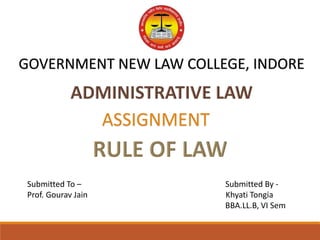Admin law- rule of law
- 1. GOVERNMENT NEW LAW COLLEGE, INDORE ASSIGNMENT Submitted To – Submitted By - Prof. Gourav Jain Khyati Tongia BBA.LL.B, VI Sem
- 2. INTRODUCTION The term Rule of Law is derived from the French phrase ‘la principe de legalite’ (the principle of legality) which refers to a government based on principles of law and not of men. Rule of Law is a legal principle that law should govern a nation, and not arbitrary decisions by individual government officials. In simple words, ‘men are ruled by law and not by men’. It primarily refers to the influence and authority of law within society, particularly as a constrain upon behaviour, including behaviour of government officials.
- 3. POSTULATES OF RULE OF LAW In 1885, Professor A.V Dicey developed this concept and propounded three principles or postulates of the rule of law in his classic book Law and the Constitution. According to Professor A.V Dicey, for achieving supremacy of law three principles of postulates must be followed which are as follows: 1. Supremacy of law, 2. Equality before law and 3. Predominance of Legal Spirit
- 4. PRINCIPLES OF RULE OF LAW • Law is Supreme, above everything and everyone. • Nobody is above the law. • All things should be done according to law and not according to whim. • No person should be made to suffer except for a distinct breach of law. • Absence of arbitrary power being the heart and soul of the rule of law. • Equality before the law and equal protection of the law. • Discretionary power should be exercised within reasonable limits set by law. Adequate safeguard against executive abuse of powers.
- 5. RULE OF LAW UNDER INDIAN CONSTITUTION At the time of framing of Constitution, Rule of law was adopted from England by our constitutional fathers and many provisions were incorporated in the Indian Constitution. Indian Constitution is considered to be supreme and no one is above Indian Constitution. Rule of law is also given impliedly in the preamble and such concept is enshrined in Part III of the Indian Constitution. In case of violation of such rights, one can approach Supreme Court or High Court under Article 32 and 226 of the Indian Constitution. The Constitution of India is enriched with the principles of law i.e. justice, equality and liberty.
- 6. It has been held that the rule of law pervades the constitution as its basic feature and cannot be taken away even by an amendment of the constitution The doctrine of ultra virus to some extent is a derivation of the principle of the rule of law. The former underlines that power should be exercised according to law. The later, goes one step further and states that an action of any official or agency beyond the scope of power given to it is ultra virus (i.e. beyond power), hence it is considered as null and void. An ultra virus act does not have any binding effect in the eyes of the law. DOCTRINE OF ULTRA-VIRES
- 7. PROOF OF EXISTENCE OF RULE OF LAW IN INDIA • Separation of powers • Fundamental Rights – especially Art. 21 • Judicial Independence and Impartiality • Judicial Review • Fair and Just Procedure • Speedy Trial • Protection of Human Rights
- 8. RULE OF LAW AND THE INDIAN JUDICIARY • In Indira Gandhi v. Raj Narain(AIR 1975 SC 2299) : Article 329-A was inserted in the Constitution under 39th amendment, which provided certain immunities to the election of office of Prime Minister from judicial review. The Supreme Court declared Article 329-A as invalid since it abridges the basic structure of the Constitution. • Bachan Singh v. Union of India (AIR 1982 SC 1325) : Bhagwati J said “rule of law excludes arbitrariness and unreasonableness”
- 9. • Kesavananda Bharati v. State of Kerala (AIR 1973 SC 1461) : It was held that Rule of Law is a part of basic structure on the Indian Constitution and, therefore, it cannot be abrogated or destroyed even by Parliament. • ADM Jabalpur v. Shivkant Shukla (AIR 1976 SC 1207) : In this case, the question before the court was ‘whether there was any rule of law in India apart from Article 21’. This was in context of suspension of enforcement of Articles 14, 21 and 22 during the proclamation of an emergency. The Supreme Court held that there is no rule of law other than the constitutional rule of law. Article 21 is our rule of law. If it is suspended, there is no rule of law.
- 10. CONCLUSION On a brief overview of the constitutional provisions and judicial decisions, it can be safely concluded that the Indian Constitution enshrines the rule of law as a fundamental governance principle, though the term is not mentioned expressly in the text of the Constitution. It is the present day modernized name for natural law. Thus, to upheld Supremacy of law, Rule of Law is the best tool to achieve the same.
